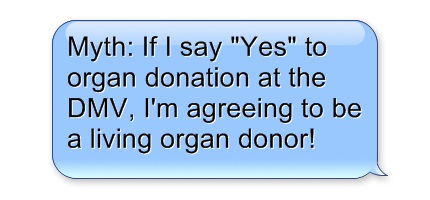
Myth: If I say "Yes" at the DMV to registering as an organ donor, I am agreeing to be a living donor for someone right now!
By agreeing to join the NC donor registry at the DMV, you are giving consent to being an organ and eye donor after death, not in life. The DMV plays no role in seeking out living donors. In fact, individual transplant centers are the organizations to work with in regards to living donation opportunities here in North Carolina.
What is living donation? There are several organs that can be donated, either in full or part, while a person is living. The most common organ given by a living donor is a kidney. In 2012, there were 124 living kidney donations performed here in North Carolina. It is possible for a person to donate a part of their liver to someone; this is most common between a parent and a child. Other rarer living donation opportunities include a lobe of one's lung or a portion of one's pancreas or small intestine.
So how does living donation work? Do you need to know the person you are donating to or can it be an anonymous donation? For all questions related to living donation, UNOS has created an excellent resource guide. We highly recommend reviewing it if you are considering being a living donor. The next step: contact one of our local transplant centers by clicking on the Living Donation button below.
But, again: that red heart on your license has nothing to do with living donation. When you say "Yes!" at the DMV, you are giving your consent to being an organ and eye donor at the time of your death. Be sure to share your decision with your family.